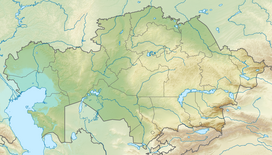The Myrzhyk Range (Kazakh: Мыржық жотасы), also spelled Murzhik (Russian: Муржик), is a mountain massif in the Zhanasemey District, Abai Region, Kazakhstan. The northwestern corner of the range is in Karkaraly District, Karaganda Region.[1]
| Myrzhyk Range | |
|---|---|
| Мыржық жотасы | |
 Myrzhyk Range Sentinel-2 image | |
| Highest point | |
| Peak | Yegibai |
| Elevation | 970 m (3,180 ft) |
| Coordinates | 49°57′49″N 77°17′18″E / 49.96361°N 77.28833°E |
| Dimensions | |
| Length | 60 km (37 mi) WNW / ESE |
| Width | 25 km (16 mi) NNE / SSW |
| Geography | |
Location in Kazakhstan | |
| Location | Kazakhstan |
| Range coordinates | 49°59′N 77°18′E / 49.983°N 77.300°E |
| Parent range | Kazakh Uplands |
| Geology | |
| Orogeny | Alpine orogeny |
| Age of rock | Proterozoic and Ordovician |
| Type of rock | Metamorphic rock |
Myrzyk village is located at the feet of the northern slopes of the range, 148 kilometers (92 mi) to the northeast of Karkaraly city.[2] There is an extensive burial ground of the early Bronze Age in the area of the range.[3]
Sary-Uzen/Murzhik is located in the Semipalatinsk Test Site complex.[4] 24 nuclear explosion tests were carried out in it between 1965 and 1980.[5][6]
Geography
editThe Myrzhyk Range is part of the Kazakh Upland system (Saryarka). It is a range of moderate altitude located in the northeastern sector of the highlands. Myrzhyk is slightly lower than the massifs in its immediate vicinity, but its size is significantly larger.[7] The Degelen massif lies 40 kilometers (25 mi) to the ESE of the eastern slopes and Mount Ku 40 kilometers (25 mi) to the WSW. A lake named Karasor lies off the west of the northwestern end of the range.[2]
The highest point of the Myrzhyk is 970 meters (3,180 ft) high Yegibai, located in the central area of the range. The higher elevations consist of summits of exposed rock. 115 kilometers (71 mi) long river Saryozen, of the Irtysh basin, has its sources in the range.[1][7][2]
Flora
editSteppe vegetation is present in the areas where there is soil between the rocks, including sagebrush, sedges and shrubs. There are meadows growing in protected valleys and ravines, as well as clumps of birch, willow, wild rose and juniper.[1]
See also
editReferences
edit- ^ a b c Nature of Kazakhstan: Encyclopedia / General editor. B. O. Jacob. - Almaty: "Kazakh Encyclopedia" LLP, 2011. T.Z. - 304 pages. ISBN 9965-893-64-0 (T.Z.), ISBN 9965-893-19-5
- ^ a b c Google Earth
- ^ Памятники Северного и Центрального Казахстана
- ^ General Summary of the Soviet Underground Nuclear Test (UNT) program — A short statistical description with special reference to the UNTs at Semipalatinsk (STS).
- ^ Semipalatinsk test site. Present state.
- ^ International Nuclear Information System (INIS)
- ^ a b "M-43 Chart (in Russian)". Retrieved 4 October 2022.
External links
edit- Media related to Myrzhyk at Wikimedia Commons
- The implication of diachronic changes reflected in LBA bronze assemblages of Central Kazakhstan
- Могильник Сангыру-1 — Қарағанды Мәдениет
